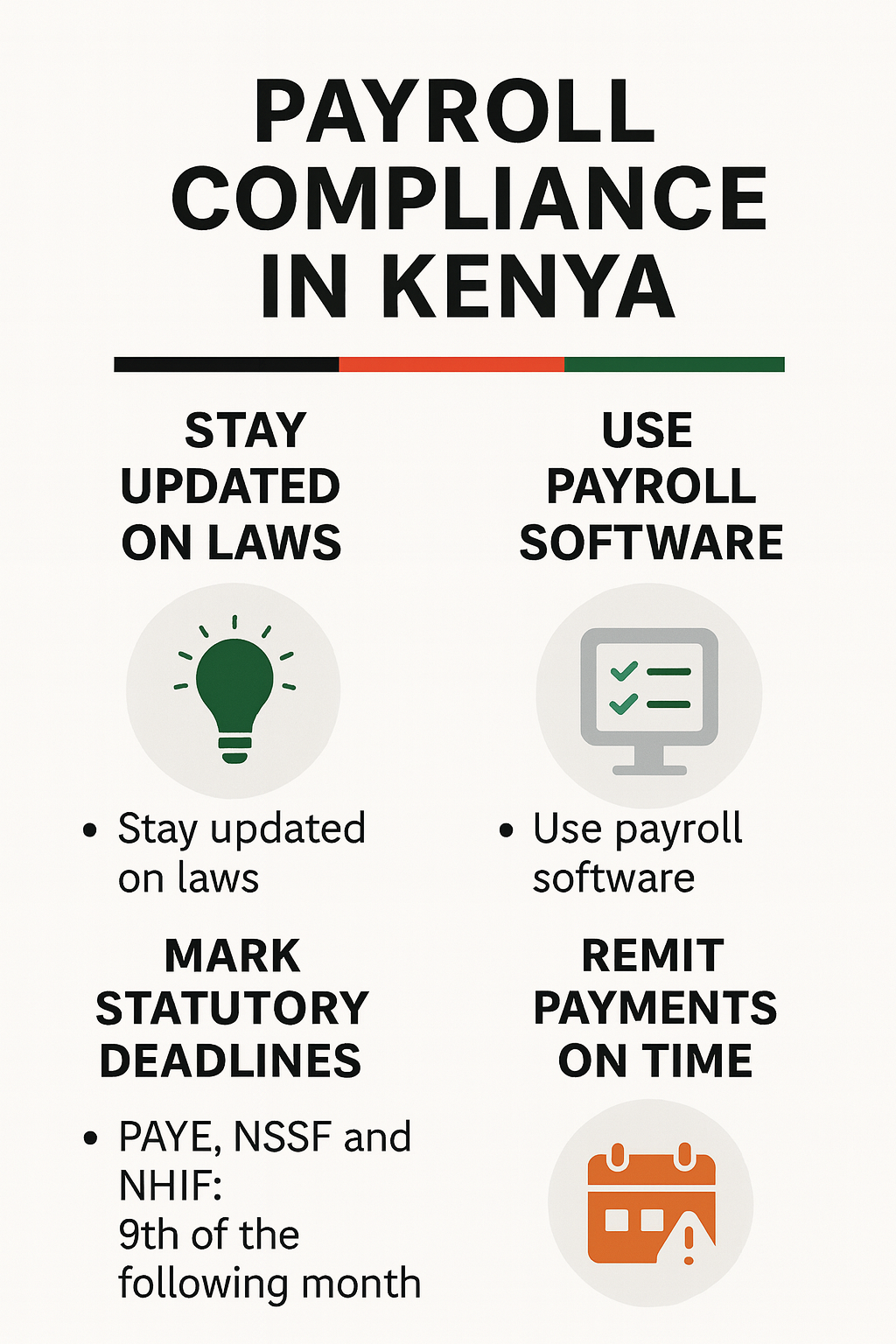Payroll Processing Services in Kenya
Payroll & Statutory Compliance in Kenya
Managing payroll in Kenya is more than just paying salaries on time. Employers have a legal duty to ensure that wages are processed accurately, deductions are handled correctly, and statutory obligations are met in line with Kenyan laws. Failure to comply can lead to penalties, legal disputes, and reputational damage
Understanding Payroll Compliance in Kenya
Payroll compliance refers to the process of managing employee payments in a way that follows all legal requirements. This covers everything from calculating gross pay to making statutory deductions and remitting them to the relevant government bodies within the set deadlines.
The main laws governing payroll in Kenya include:
-
The Employment Act, 2007 – Sets out employee rights, working hours, and payment terms.
-
The Income Tax Act (Cap 470) – Guides on Pay As You Earn (PAYE) deductions and returns.
-
National Social Security Fund (NSSF) Act – Requires employer and employee contributions to social security.
-
National Hospital Insurance Fund (NHIF) Act – Mandates contributions towards healthcare.
-
Labour Institutions Act – Regulates minimum wages and other labour-related requirements.
Key Statutory Deductions in Kenya
Employers must make several statutory deductions from employees’ salaries and remit them promptly. The most common include:
1. PAYE (Pay As You Earn)
PAYE is a tax deducted from employees’ monthly salaries based on income brackets provided by the Kenya Revenue Authority (KRA). Employers are required to:
-
Deduct the correct amount from each salary.
-
Remit it to KRA by the 9th of the following month.
-
File monthly PAYE returns through the iTax system.
2. NSSF Contributions
NSSF provides retirement benefits to employees.
-
Both employer and employee contribute 6% of the employee’s monthly gross earnings, up to the maximum tier limits.
-
Contributions must be submitted to NSSF by the 9th of the following month.
3. SHIF Contributions
SHA covers employees’ medical insurance.
-
The amount is based on gross monthly income and ranges from Ksh 150 to Ksh 1,700.
-
Payments must be remitted to SHA by the 9th of the following month.
4. Other Possible Deductions
Depending on the sector and employment contracts, deductions may include pension schemes, SACCO contributions, HELB loan repayments, and union dues. All such deductions must be lawful and agreed upon in writing.
Payroll Record-Keeping Requirements
Kenyan law requires employers to maintain accurate payroll records for each employee, including:
-
Full name and contact details.
-
Job title and employment terms.
-
Gross and net salary.
-
All deductions made.
-
Dates and amounts of remittances to statutory bodies.
Records should be kept for at least five years, as they may be reviewed during audits or legal disputes.
Common Payroll Compliance Challenges in Kenya
Many employers especially small and medium enterprises struggle with payroll compliance due to:
-
Frequent changes in tax laws and contribution rates.
-
Inaccurate salary calculations.
-
Missing statutory deadlines.
-
Poor record-keeping.
-
Limited knowledge of labour laws.
These challenges can lead to penalties, interest charges, and strained employee relations.
How to Ensure Payroll & Statutory Compliance
-
Stay Updated on Legal Changes
Follow updates from KRA, SHIF, NSSF, and the Ministry of Labour to ensure you apply the latest rates and rules. -
Use Payroll Software
Automating payroll helps reduce human error, ensures accurate calculations, and generates compliant reports. -
Maintain Clear Employment Contracts
Ensure contracts clearly outline salaries, allowances, deductions, and benefits to avoid disputes. -
File and Remit on Time
Mark statutory deadlines on your calendar or set reminders to avoid penalties. -
Train Your HR and Finance Teams
Regular training ensures your team understands compliance requirements and can handle payroll efficiently. -
Engage a Payroll Service Provider
Outsourcing payroll to professionals can help you remain compliant and focus on your core business.
The Cost of Non-Compliance
Non-compliance with payroll and statutory obligations in Kenya can be costly. Potential consequences include:
-
Fines and penalties from government agencies.
-
Legal claims from employees.
-
Damage to your company’s reputation.
-
In severe cases, business closure or criminal liability.
In addition to Employer of Record Services, we provide payroll processing and compliance in Kenya.

